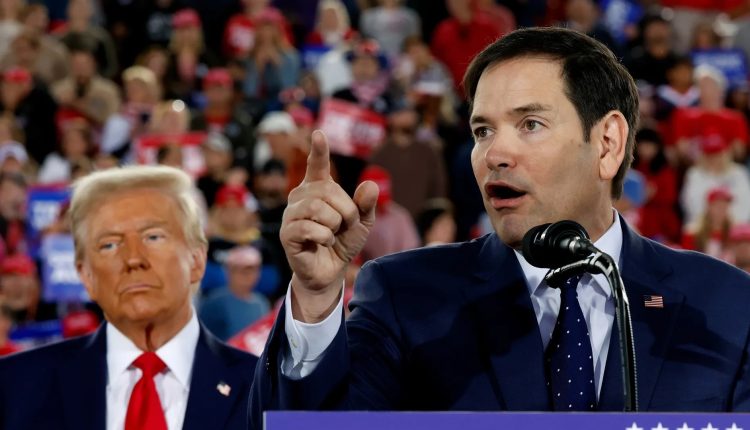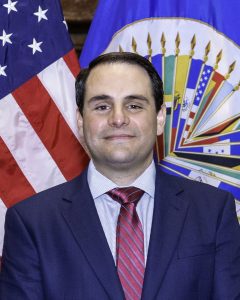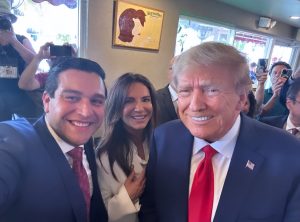
Donald Trump’s Florida government (+Español)
The first president of the United State from Florida will be Donald Trump. Although he is originally from New York, Florida “adopted” him when he decided to move to that state in November 2019.
“In New York they treated me very badly,” said the then president. The reason for his displeasure was his ‘persecution’ for tax evasion and the demand to make public the state of his finances, something that the tycoon refuses to comply with, breaking with a “show of integrity” that has been in the American political tradition for decades.
In Florida, he hoped to be “treated better” by the political and judicial authorities, as well as to take advantage of the tax advantages of the state, which has become a paradise for millionaires who come from everywhere. In addition, there he has one of his lavish properties, the Mar-a-Lago resort in Palm Beach, converted into what Trump calls the “Center of the Universe.”
Trump’s presence shifted the center of gravity of the Make America Great Again (MAGA) movement to Florida, where it found fertile ground in a conservative tradition that dates back to the origins of the state, the last frontier of the American Deep South.
Linked to slavery, racial segregation and the violation of the civil rights of minorities, the power of the Democrats in the territory was consolidated. Considered in its origins as a white, agrarian party, with a strong presence of evangelical fundamentalism, in Florida the metamorphosis promoted by Franklin Delano Roosevelt’s “New Deal” had little support, which moved that party to the “left” in other parts of the United States. Being a Democratic state never meant being mostly liberal in Florida.
The Republicans, on the other hand, the anti-slavery party of Abraham Lincoln, exponents of the industrial and financial expansion of the emerging American imperialism – they called themselves “progressives” – hegemonic since the Civil War, but displaced from power by the unusual “Rooseveltian” coalition, evolved in the opposite direction and gained followers among the conservative, southern Democrats, until they became the party of the right, which increased their influence in Florida and accentuated the political polarization of the country.
Of the 46 governors that the state of Florida has had in its U.S. history, 33 have been Democrats; but the Republicans have not lost that position since Jeb Bush was elected governor in 1999. Among the Democratic presidential hopefuls, only Barack Obama has triumphed in the state so far this century, won twice by the Republican George W. Bush, and three times by Donald Trump, who is now entering his second term. Breaking a long-standing historical pattern, Republicans have outnumbered Democrats in voter registration since 2021.
To a large extent, this Republican advance was the result of the neoconservative offensive that took hold with Ronald Reagan’s rise to power in 1980. Among the forces that drove Republican dominance in the state were many Cuban-Americans, who added other characteristics to the process. Originally linked to the CIA and being the great beneficiaries of the war against Cuba, Cuban-American politicians incorporated the most brutal violence into local political life, reinforced contacts with the mafia and drug trafficking — endemic evils in Miami’s history — and projected the city as the capital of the Latin American right.
This is the scenario that Donald Trump finds himself in when he decides to install the MAGA movement’s general staff in Florida. A legion of ultra-conservative political activists came from the rest of the country to orbit around the New Yorker, but the state’s Republican politicians also found the opportunity to increase their specific weight in national politics.
Many Floridians who initially opposed the tycoon became his worshippers, and in this way Senator Marco Rubio has managed to be nominated for Secretary of State. Susie Wiles, an enigmatic activist of many Republican campaigns in the state, who some consider a key factor in Trump’s victory, has been named chief of staff to the President. Mike Waltz, current Florida legislator and retired colonel of the National Guard, characterized as a hawk in foreign policy, has been designated as advisor for National Security Affairs, and Pam Bondi, a former Florida attorney general, who was part of Trump’s defense team, has been nominated for attorney general. It is said that even Governor Ron De Santis is being considered for Secretary of Defense, which would effectively make Mar-a-Lago the “White House of the South,” as the local press proudly calls it.
In the area of foreign policy, it seems that Donald Trump’s tendency will be to name family and friends as ambassadors or special envoys of the president, which will take Marco Rubio’s role away from issues vital to the United States, such as relations with Europe — especially with regard to Russia and the war in Ukraine — the Middle East or even China and the rest of Asia, issues in which Rubio contributes little, despite his stay on the Senate Intelligence Committee, and his ties to large donors interested in foreign policy, particularly with the Jewish lobby.

However, that will not be the case with regard to Latin American policy, where Rubio incorporates an approach and relations with the Latin American right which should condition this policy. This trend is complemented by the appointment of two other Cuban-Americans to key positions in the State Department: also Floridians Carlos Trujillo and Mauricio Claver Carone, as deputy assistant secretary for the Western Hemisphere and special envoy for Latin America, respectively.
Even the appointment of Christopher Landau as assistant Secretary of State, former ambassador to Mexico and lawyer for Cuban-American plaintiffs in lawsuits against U.S. companies for doing business with Cuba, and linked to the most conservative sectors of the U.S. judicial apparatus – he served as an aide in the Supreme Court of Justices Antonin Scalia and Clarence Thomas – reaffirms this projection towards the extreme right in the Latin American policy of the next government.
Although this is not a new phenomenon, since Reagan there has been talk of the “Cubanization” of the policy towards Latin America, due to the participation of Cuban-Americans of the extreme right in the design and application of this, never before has their influence been so evident. It is not out of the question that, given the possible reduction of their influence on other events, the “Miami Cubans” will “entertain themselves” with the policy towards Latin America and Trump will let them do so in order to “keep Little Marco happy,” as occurred in the case of Cuba during his previous term.

Furthermore, it is not that these people are bearers of a mentality foreign to that of the president, but that Trump conceives Latin America as a bunch of “shithole countries” and that they should be treated as such, reviving the most interventionist tendencies of the Monroe Doctrine. This team has the task of “putting order in the region,” according to Donald Trump, especially on the immigration issue, which predicts tensions with Mexico and strong pressures on Central American countries. Add to that the issue of the Panama Canal, where, to top it all off, an obscure county commissioner from Miami-Dade — with no experience in foreign policy, but a fanatical defender of the president-elect–, Cuban-American Kevin Marino Cabrera has been named ambassador to Panama.
It is to be expected that the U.S. policy towards Cuba, Venezuela and Nicaragua will become more severe, which has been the leitmotiv of the careers of these people, as well as a very tense relationship with progressive governments, especially those of Brazil and Colombia, whose presidents have been the object of personal attacks by Marco Rubio himself. After the victory of the Frente Amplio in Uruguay, only Javier Milei, the president who consults with his dead dog, appears as an enthusiastic collaborator of Trumpism in Latin America. Although it is also true that “peace through strength,” a philosophy that Marco Rubio claims to defend, ends up subordinating some who today pride themselves on being independent.
Ultimately, Trumpism will be an impulse for the advance of the extreme right in Latin America, whatever the future of Marco Rubio as Secretary of State may become. Amid the contradictions that persist in the unstable coalition that supports Donald Trump, and the conflicts inspired by the president’s personality, it is difficult to predict the permanence of this group in the government apparatus. However, regardless of the move, one result that seems irreversible, in the short and medium term, is the establishment of Florida as a Republican and conservative state, which will have contradictory consequences for the region.
Although it consolidates the state’s influence in national politics, and places it as one of the country’s power centers, it also reduces the appeal of being a swing state, unpredictable in presidential elections, which implied an importance, attention and political dynamism that it will not have in the future.
On the other hand, Trumpism has brought Florida back to an extreme degree of right-wing fundamentalism, reminiscent of the most retrograde moments in the state’s history. The senseless increase in xenophobia in a multiethnic region, which depends on its relations with foreign countries and where more than 10% of the population are immigrants; as well as the imposition of religious obscurantism and the persecution of progressive ideas considered “heretical” by the new inquisitors, are some of the consequences.
By turning red, the color that identifies the Republicans, Florida has lost the attributes that gave it a certain exceptionality in the American political context, becoming an undifferentiated part of the other half of the country–its worst half, by the way.

